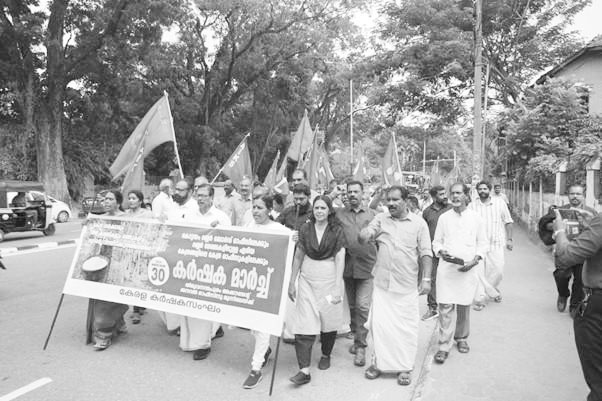
The AIKS has flagged reduced buying by tyre monopolies in Kerala in recent weeks to create panic in the market.
THE All-India Kisan Sabha (AIKS) has sought the union government’s intervention in checking the falling prices of natural rubber. The price of rubber in Kottayam, where the Rubber Board is located, has fallen to Rs 184 per kg in October after rising to Rs 247 per kg during August this year.
On October 30, the Kerala Karshaka Sangham, the state unit of AIKS, held a protest march to the Rubber Board Office and other district centres, demanding the union government’s intervention to stabilise the prices.
The rubber farmers said they suspected cartelisation by rubber manufacturers for the sudden fall in prices, even as imports have increased steeply during the past few months, especially when rubber prices increased in the domestic market.
IMPACT OF DROP IN PRICES
With Kerala producing 90 per cent of the country’ natural rubber, more than 10 lakh rubber farmers and around five lakh workers depend on the sector for their livelihood. The drop in prices affects these families, particularly small farmers and workers.
The farmers, though the prices increased during August, were slow to increase production considering market volatility.
“The Kerala Karshaka Sangham held a rally to the Rubber Board in Kottayam and held protests in all the districts against the inaction of the union government in stabilising the falling prices of natural rubber”, K J Joseph, state vice president of AIKS, said.
The instability in prices, increasing import and other conditions, including climate change, are affecting the livelihood of lakhs of rubber farmers in Kerala and other natural rubber producing states, such as Tripura.
“The situation is very grave in Kerala where rubber farmers are fighting an existential crisis. It is equally bad in Tripura where rubber is an important source of income for the majority of tribal farmers”, an AIKS statement read.
Rubber prices in other districts of Kerala, excluding Kottayam, Pathanamthitta and Ernakulam, are lower by Rs 5-10 per kg than the traders’ price. Also, the prices in the international market (Bangkok, Thailand) are higher by Rs 30 per kg.
PRICE MANIPULATION ALLEGED
While farmers in India are generally suffering due to falling crop prices, the import of natural rubber increased by 22 per cent between April and September 2024.
“Rubber imports surged 22 per cent year over year, jumping from 2,54,488 tonnes last year to 3,10,713 tonnes this year. It may be noted that when the prices of natural rubber in the international market prevails over the domestic market, the Ministry of Commerce does not take steps to export natural rubber to help farmers fetch a better price”, the AIKS statement said.
Given the history of cartelisation by tyre manufacturing companies in India, resulting in falling rubber prices affecting the farmers and massive profit for the manufacturers, the Kerala Karshaka Sangham and AIKS suspect another attempt by the companies to pull down prices.
“Recent scientific studies on the natural rubber market in Kerala have demonstrated how tyre monopolies jointly stop procuring from the domestic market to artificially plummet the price. Several traders from Kerala have publicly stated that the tyre monopolies have consciously stopped buying natural rubber in the recent weeks to create panic in the market”, the statement added.
The AIKS has urged the union government to regulate the tyre industry’s monopolistic practices and price manipulation and punish tyre cartels for artificially reducing the prices for the farmers.


